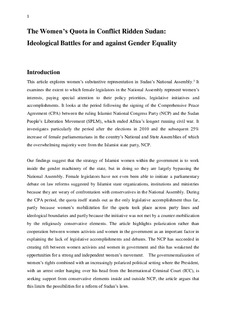The Women's Quota in Conflict Ridden Sudan: Ideological Battles for and against Gender Equality
Journal article, Peer reviewed
Permanent lenke
http://hdl.handle.net/11250/2484806Utgivelsesdato
2013-01-01Metadata
Vis full innførselSamlinger
- Publications [1488]
Originalversjon
in Women's Studies International Forum vol. Volume 41 no. Part 2 pp. 122-131 10.1016/j.wsif.2013.03.00610.1016/j.wsif.2013.03.006
Sammendrag
This article explores women's substantive representation in Sudan's National Assembly. It examines the extent to which female legislators in the National Assembly represent women's interests, paying special attention to legislative initiatives and accomplishments following the signing of the peace agreement in 2005. The article highlights polarization rather than cooperation between women activists and women in the government as an important factor in explaining the lack of legislative accomplishments. There are competing gender ideologies between women activists demanding gender equality ( musawah ) and female legislators calling for gender equity ( insaf ). They are operating from isolated islands. The article argues that this limits the possibilities for a reform of Sudan's laws. Further, the increasingly polarized political landscape, limits the possibilities for even minor reforms on women's issues in the few areas where there is in fact a broad agreement between women activist and women in government on what constitutes acting in the interest of Sudanese women. Particularly after the International Criminal Court issued an arrest order for president Bashir in 2009, he has on more occasion than one turned to the religiously conservatives for support. While the religiously conservatives have the president's ear, the reformist voices within the government are marginalized, including the women. A preprint of the article can be downloaded as a Pdf file above
Serie
Women's Studies International Forum vol. Volume 41 no. Part 2Women's Studies International Forum vol. Volume 41 no. Part 2
